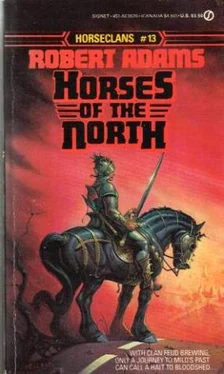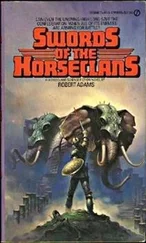“I am Colonel Ian James Alexander Lindsay, officer commanding the 228th Provisional Battalion (Reinforced). Our orders are to provide support and protection for and to the MacEvedy Experimental Agricultural Station and all its personnel. An attack upon the station or upon my fort will be considered by me to constitute an attack upon the Canadian government itself, and I shall repel such an affront with all necessary force, treating you all as the criminals that such actions will have irrevocably branded you.”
The first attack came howling and screeching at the walls a bare hour after the leaders had been shoved out the gates of the fort. It had been repulsed, of course, bloodily repulsed, and the remainder of that day and the night that followed it were made hideous by the moans and cries of wounded, dying, untended rovers and by the screams of injured horses.
But there had been another attack, headlong, no whit different from the initial exercise in futility and mass suicide; this second attack came at dawn of the next day. Bare hours later, they came at the walls once more, and once more the bullets from the rifles and the automatics, shrapnel from mortar bombs and rockets cut down the starveling rovers long before any one of them had won to within bowshot of the embattled fort. They attacked one more time; then they had had enough.
Colonel Lindsay had had patrols follow the retreating raiders, and when he received the report that they had set up a camp some miles southeast of the fort, he had led out his command in two motorized columns, taking charge of one and turning over the other to his son. They moved slowly that night, so as not to wear out the horse-mounted unit of Captain Keith. Nonetheless, by false dawn, everyone was in position and Colonel Lindsay gave orders to commence firing on the sleeping encampment.
The defeated rovers, never suspecting that the victors might pursue them and complete the butchery, had chosen their campsite on grounds of comfort rather than easy security. The few sleepy sentries they had posted on the low hills almost surrounding the camp had quickly succumbed to wire garrotes and sharp knives, and cautious, silent patrols had established that there existed no second line of sentinels closer to the camp.
Muttering under his breath about rank amateurs playing at the game of war, Colonel Lindsay supervised the emplacement of the mortars and the two armored vehicles mounting 75mm guns; the few rockets brought along were all of the hand-held variety and could therefore be easily shifted to targets of opportunity when once the slaughter had commenced.
Then it was only waiting, waiting until the bursting double star of a purple flare told that First Captain Lindsay and his group were in place. With the bright glare of a rising sun hot on the backs of Colonel Lindsay’s bombardment group, most of the rovers could not see even the four-yard-high spouts of flame from the discharging mortars, so had no idea whence was coming the rain of explosive death, and the vast majority of them died within a few minutes there in that hill-girt vale, torn asunder by the explosive shells and bombs and rockets, shredded by the shrapnel, trampled to death by loosed horses mad with pain and terror or cut down by their own bemused comrades all stumbling about in the dusty, smoky, chaotic slice of very hell that they just then were occupying.
At what he felt was the proper time, the colonel had lifted the brutal barrage and Captain Keith’s horsemen had come into view over the crest of the hill, between the gun and mortar emplacements, forming up among the low-growing brush that clothed the easy slope down to the blood-soaked, cratered vale. Sabers were drawn, lances leveled, to the peal of a bugle. Even in their shock, the surviving prairie rovers below could see just what horror next was coming their way, and it was just too much for them. They broke and streamed westward toward the second broad break in the circle of hills, where the stream ran southward.
No one of them made to try to catch one of the few sound horses, they just took to their heels, one and all, many discarding their weapons as needless encumbrances to flight. They ran like the formless mob they were become and fell in high windrows before the murderous crossfire of First Captain Lindsay’s group, equipped with almost all the automatics.
The few hundred who got out onto the prairie did so either by purest chance or by clawing their way up the steep inner slopes of the southern hills and circumventing the line of troop carriers and machine-gun positions. But few of even these escaped with their lives, not for long, at least, for the vehicles, the horsemen of Captain Keith and, where necessary, foot patrols pursued and harried the scattered survivors relentlessly for many a mile. They took no prisoners and left the flea-bitten carcasses where they had fallen, that their picked and bleaching bones might serve as mute warning to other prairie rovers of equally larcenous intent.
A few got away, of course, and they and those who heard them had spread word of the savage extermination of the original pack of thousands far and wide on the prairies and plains. For three decades, no band of nomads, no matter how desperate, seriously considered trespass within range of that grim, implacable band of proven man-killers.
But time passes, a new generation slowly displaces the older generation, bones crumble away to dry dust, and memories of long-past disasters dim and fade.
During the most of those thirty-odd years, the present Ian’s father, Colonel David Lindsay, had commanded, and, under his aegis, the sinews of war so long unused had ceased to be hoarded against a future need that might (he strongly felt) never again come. He had died in a land at peace, secure in the belief that his way had been the right one.
But now his successor, his only son, who had loved him and who still honored his memory, had to face the fact that his late father had been wrong, that fort and station and the folk therein soon would face foemen as deadly as those of long ago, but this time without the tools and machinery of warfare which had given them so easy and complete a victory the last time.
The irreplaceable petrol and diesel fuel had been expended many long years ago, mostly to power farming machinery, the generators and the vehicles sent out to garner anything still usable from towns and settlements within cruising range. Small-arms ammunition had been used in defending these expeditions from the bands of skulkers, as well as for bagging game.
As the supplies of fossil fuels had dwindled, Colonel David Lindsay had taken the heavy armored tracked vehicles out of use, turning the two light tanks into nothing more than immobile pillboxes—sunk into the ground and partially covered with logs and earth—while the troop carriers became aggregations of spare parts for any wheeled vehicle or farm machine that could adapt those parts to its use.
When the time had finally come when there was no more powder to reload cartridges for small arms, an attempt was made to use the propellant from dismantled artillery shells. This had been an unmitigated disaster, resulting as it had in ruined weapons and dead or permanently crippled soldiers. The colonel had then gone back to the old books and gleaned from them a formula for a form of gunpowder that could be manufactured with easily available ingredients and equipment.
This powder did work most of the time, and it would propel a bullet with sufficient force to bring down men and game. However, it would not for some reason cause the rifles and automatics to operate properly, as had the original loads, so that a man was required to pull back the operating handle between shots, which fact vastly reduced the firepower of the 228th. This, coupled with their by now almost nonexistent mobility made them sitting ducks, perfect, tailor-made victims-in-waiting—too slow to run or maneuver and too weakened to fight—and this sorry state of affairs preyed long and often upon Colonel Ian Lindsay.
Читать дальше












